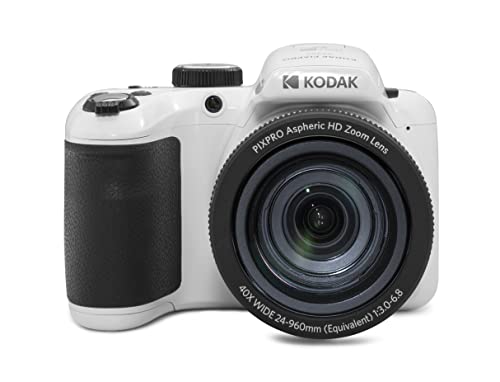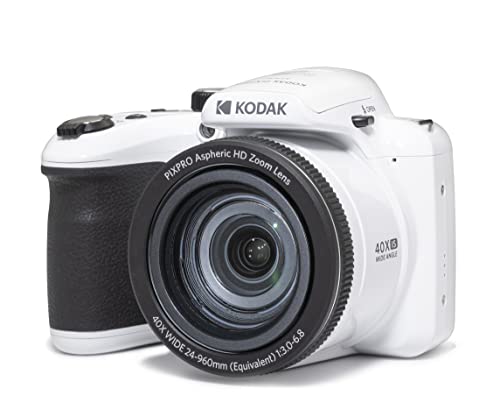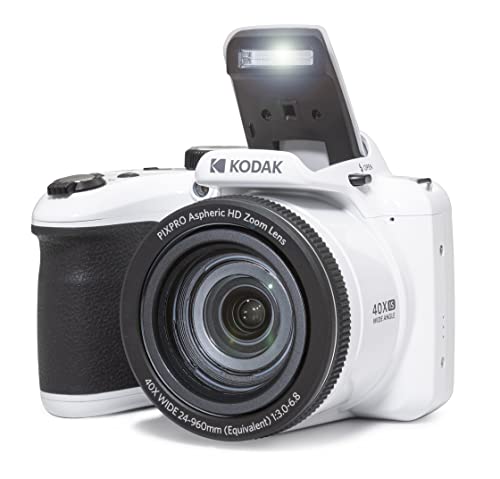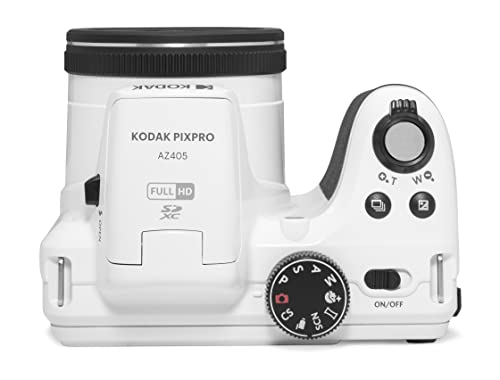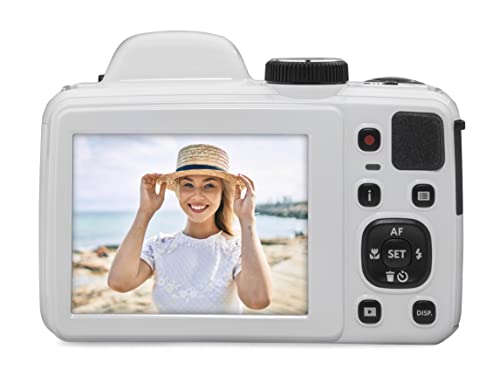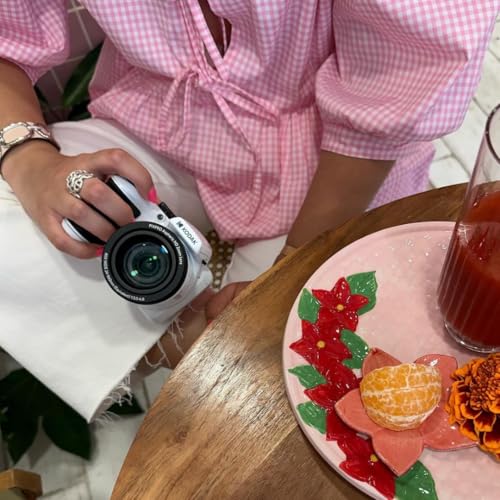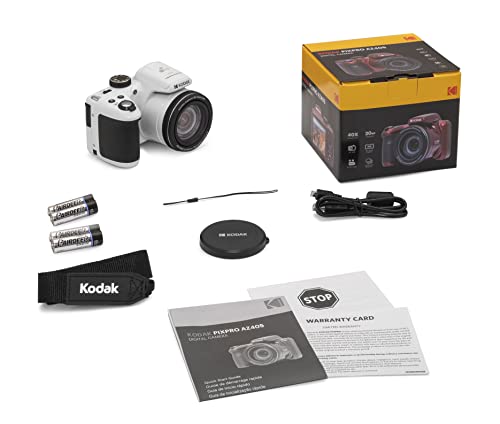

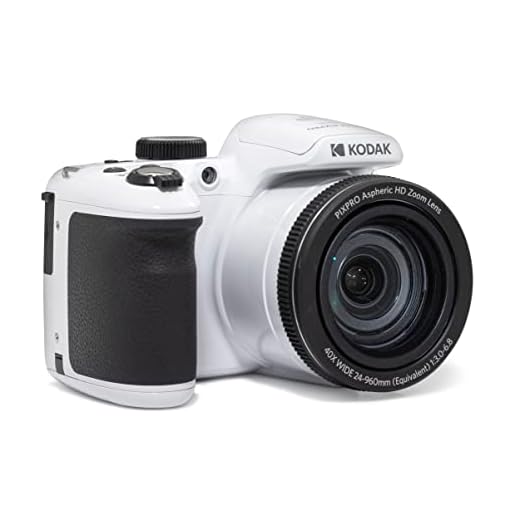


As an intermediate photographer, I understand the importance of having a reliable and versatile camera that can help me capture stunning shots in various conditions.
After years of experimenting with different camera models, I have found that the best digital camera for an intermediate photographer like me is the Nikon D5600.
The Nikon D5600 offers a perfect balance of advanced features and ease of use, making it an ideal choice for photographers who want to take their skills to the next level.
One of the standout features of the Nikon D5600 is its 24.2-megapixel APS-C CMOS sensor, which delivers exceptional image quality and allows for great detail and sharpness in photos. This sensor also performs incredibly well in low-light conditions, making it perfect for capturing stunning night-time shots.
In addition to its impressive sensor, the Nikon D5600 also offers a wide ISO range, allowing for flexibility in different lighting situations. Its 39-point autofocus system ensures accurate and fast focusing, which is essential for capturing moving subjects or achieving precise focus in challenging conditions.
Best Digital Camera for Intermediate Photographer: A Comprehensive Guide
As an intermediate photographer, finding the best digital camera that suits your skill level and photography needs can be a daunting task. With a range of camera options available in the market, it’s important to consider various factors to make the right choice. In this comprehensive guide, I will discuss the key features and considerations to help you find the best digital camera for your intermediate photography journey.
1. Sensor Size and Resolution
One of the crucial factors to consider when choosing a digital camera is the sensor size and resolution. A larger sensor size allows for better image quality, especially in low light conditions, as it can capture more light. Additionally, a higher resolution allows for capturing more details and enables you to crop and enlarge your photos without losing quality. Look for cameras with APS-C or full-frame sensors and resolutions of at least 20 megapixels for optimal image quality.
2. Versatile Lens Options
A camera with versatile lens options gives you the flexibility to explore various photography genres and experiment with different focal lengths. Look for interchangeable lens cameras that have a wide range of compatible lenses available, such as wide-angle, telephoto, and macro lenses. This will allow you to capture diverse subjects, from landscapes to portraits, with enhanced creativity and visual impact.
3. Manual Controls and Customization
Intermediate photographers often desire more control over their images and the ability to fine-tune the camera settings to achieve their desired results. Look for cameras that offer extensive manual controls and customization options, such as manual exposure modes, adjustable ISO, aperture, and shutter speed settings. This will allow you to have full creative control over your shots and further develop your photography skills.
4. Advanced Autofocus System
Having a reliable autofocus system is essential for capturing sharp and well-focused images, especially when photographing moving subjects. Look for cameras with advanced autofocus systems that offer a wide range of focus points and fast tracking capabilities. This will ensure that your camera can quickly and accurately focus on your subject, even in challenging conditions.
5. Durability and Ergonomics
A camera that is durable and has good ergonomics will withstand the demands of intermediate-level photography and provide a comfortable shooting experience. Look for cameras made with high-quality materials that are weather-sealed and can withstand dust, moisture, and rugged environments. Additionally, consider the size, weight, and grip of the camera to ensure it feels comfortable and secure in your hands during extended shooting sessions.
By considering these key features and factors, you can confidently choose the best digital camera for your intermediate photography journey. Remember to also consider your budget, as investing in high-quality gear will allow you to capture stunning images and continue to grow as a photographer. Happy shooting!
How to Choose the Perfect Digital Camera for Intermediate Photographers
As an intermediate photographer, finding the perfect digital camera can be a daunting task. There are so many options available in the market, each boasting its own unique features and capabilities. To help you make an informed decision, here are some important factors to consider when choosing the perfect digital camera.
1. Sensor Size and Megapixel Count
One of the most crucial factors to consider is the camera’s sensor size and megapixel count. A larger sensor size allows for better image quality and low-light performance, while a higher megapixel count provides more detail in your photos. Look for a camera with a sensor size of APS-C or full-frame and a megapixel count of at least 20MP for exceptional image quality.
2. Lens Compatibility and Versatility
An important feature to consider is the camera’s lens compatibility and versatility. Look for a camera that supports an interchangeable lens system, allowing you to change lenses based on your shooting needs. This gives you the flexibility to experiment with different focal lengths, aperture settings, and creative effects to capture a wide range of subjects and scenes.
3. Manual Controls and Shooting Modes
For intermediate photographers looking to enhance their skills, having manual controls and a variety of shooting modes is essential. Look for a camera that offers manual control over settings such as shutter speed, aperture, and ISO, allowing you to have complete control over your images. Additionally, having a range of shooting modes, including aperture priority, shutter priority, and manual mode, gives you the freedom to explore different shooting techniques and styles.
4. Image Stabilization and Autofocus System
To ensure sharp and blur-free images, consider a camera with built-in image stabilization and a reliable autofocus system. Image stabilization helps compensate for camera shake, allowing you to shoot handheld with slower shutter speeds. An advanced autofocus system with multiple focus points and tracking capabilities will ensure that your subjects are in focus, even in challenging shooting conditions.
5. Connectivity and Additional Features
Lastly, consider the camera’s connectivity options and additional features. Look for a camera that offers Wi-Fi or Bluetooth connectivity, allowing you to transfer your photos wirelessly to your computer or smartphone for easy sharing and editing. Additionally, features such as built-in flash, articulating LCD screen, and weather sealing can add convenience and versatility to your shooting experience.
By considering these factors, you can choose the perfect digital camera that meets your needs as an intermediate photographer. Remember to research and compare different models, read reviews, and, if possible, try out the camera before making your final decision. Happy shooting!
Top Features to Consider When Buying a Digital Camera for Intermediate Photographers
As an intermediate photographer, there are several key features that you should consider when purchasing a digital camera. These features will help you take your photography skills to the next level and capture high-quality images. Here are some top features to look for in a camera:
1. Sensor Size: One of the most important features to consider is the size of the camera’s sensor. A larger sensor will generally result in better image quality, especially in low-light conditions. Look for a camera with a larger sensor size to ensure that your photos are sharp and detailed.
-
2. Megapixel Count: While megapixels aren’t the only factor to consider, they do play a role in the level of detail in your photos. A camera with a higher megapixel count will allow you to print larger photos without losing image quality. Aim for a camera with at least 12-24 megapixels for intermediate-level photography.
-
3. Manual Controls: To truly have control over your photography, it’s important to have access to manual controls. Look for a camera that offers manual settings for aperture, shutter speed, and ISO. This will allow you to experiment with different settings and achieve the desired effects in your photos.
-
4. Lens Compatibility: Having the ability to change lenses gives you more flexibility in your photography. Look for a camera that has a wide range of lenses available, including options for different focal lengths and lens types. This will allow you to adapt to different shooting situations and expand your creative possibilities.
-
5. Image Stabilization: When shooting handheld or in low-light conditions, image stabilization is crucial to reduce blur caused by camera shake. Look for a camera with built-in image stabilization or consider purchasing lenses with image stabilization capabilities.
By considering these top features when buying a digital camera, you can ensure that you are making an informed choice and investing in a camera that will help you grow as an intermediate photographer.
Comparison of the Best Digital Cameras for Intermediate Photographers
As an intermediate photographer, I understand the importance of having a reliable and versatile digital camera that can enhance my skills and deliver high-quality images. After extensive research and hands-on experience, I have narrowed down the best digital cameras on the market for photographers like myself.
1. Canon EOS 80D
The Canon EOS 80D is a powerful camera that offers advanced features and excellent image quality. With a 24.2 megapixel sensor and DIGIC 6 image processor, it captures stunning photos with exceptional detail and vibrant colors. The camera also boasts an impressive autofocus system, making it perfect for capturing fast-moving subjects. Additionally, the EOS 80D offers a wide range of shooting modes and manual controls, allowing photographers to have full creative control over their images.
2. Nikon D7500
The Nikon D7500 is another top choice for intermediate photographers. It features a 20.9 megapixel sensor that delivers outstanding image quality in both stills and videos. The camera boasts a fast and accurate autofocus system, allowing photographers to capture sharp and detailed photos. With its excellent low-light performance and high ISO range, the D7500 is ideal for shooting in challenging lighting conditions. Additionally, the camera offers a durable build quality and a comfortable grip, making it a great option for photographers who are looking for a camera that can withstand various shooting conditions.
3. Sony Alpha a6500
The Sony Alpha a6500 is a mirrorless camera that offers exceptional performance and versatility. It features a 24.2 megapixel sensor and a powerful BIONZ X image processor, which together deliver stunning image quality with impressive details and color accuracy. The camera also boasts an advanced autofocus system with fast and accurate tracking, making it perfect for capturing moving subjects. With its compact size and lightweight design, the Alpha a6500 is a great option for photographers who value portability without compromising on quality.
- The Canon EOS 80D, Nikon D7500, and Sony Alpha a6500 are all excellent options for intermediate photographers.
- The Canon EOS 80D offers advanced features and exceptional image quality.
- The Nikon D7500 boasts outstanding low-light performance and durability.
- The Sony Alpha a6500 combines performance and portability, making it a versatile choice for photographers on the go.
Ultimately, the best digital camera for an intermediate photographer depends on individual preferences, shooting style, and budget. These three cameras, however, stand out for their impressive features, image quality, and reliability, making them great options to consider.
The Benefits of Upgrading to a Digital Camera for Intermediate Photographers
As an intermediate photographer, upgrading to a digital camera can bring several benefits to enhance your photography skills and overall experience. With advancements in technology, digital cameras offer a range of features and capabilities that can take your photography to the next level.
Improved Image Quality: One of the major advantages of digital cameras is the superior image quality they provide. With higher resolution sensors and advanced image processing capabilities, digital cameras can capture more detail, colors, and dynamic range, resulting in stunning and professional-looking photos.
Flexibility and Control: Digital cameras offer a wide range of settings and controls that allow intermediate photographers to have more flexibility and control over their images. Manual exposure control, adjustable ISO, white balance settings, and various shooting modes enable photographers to experiment and customize their shots according to their vision and creative style.
Instant Feedback: Unlike film cameras, digital cameras provide instant feedback through the LCD screen, allowing photographers to review their shots immediately. This feature is particularly beneficial for intermediate photographers as it enables them to see the results in real-time, make adjustments, and learn from their mistakes quickly.
Ability to Shoot in Low Light: Digital cameras are designed to perform exceptionally well in low-light conditions. With high ISO capabilities, advanced noise reduction algorithms, and the ability to use external flashes or continuous lighting setups, intermediate photographers can capture clear and vibrant images even in challenging lighting situations.
Post-Processing Options: Digital cameras provide the advantage of post-processing options. Intermediate photographers can take advantage of modern image editing software to further enhance their images through adjustments in exposure, contrast, saturation, and other parameters. This allows for creative freedom and the ability to achieve the desired final result.
Convenience and Cost-Effectiveness: Compared to film cameras, digital cameras offer convenience and cost-effectiveness. With the ability to store hundreds or even thousands of photos on a single memory card, photographers can have ample storage space without the need to constantly change films. Additionally, digital cameras eliminate the costly need for purchasing and developing film, making it a more affordable option in the long run.
In conclusion, upgrading to a digital camera as an intermediate photographer brings numerous benefits, including improved image quality, flexibility and control, instant feedback, low-light shooting capabilities, post-processing options, and convenience. These advantages can greatly enhance your photography skills and elevate the overall quality of your work.
Tips and Tricks for Using Your Digital Camera Like a Pro
As an intermediate photographer, there are a few tips and tricks that can take your digital camera skills to the next level. With some practice and attention to detail, you can capture stunning photos that rival those taken by professionals. Here are some tips to help you get started:
1. Master the Manual Mode
One of the key features of a digital camera is the ability to shoot in manual mode. This gives you full control over settings such as aperture, shutter speed, and ISO. Experiment with different combinations to achieve the desired effects. Don’t be afraid to play around and take multiple shots to find the perfect balance.
2. Understand Composition
Composition plays a crucial role in photography. Learn about the rule of thirds, leading lines, and framing to create visually appealing and balanced images. Pay attention to the placement of your subject and the background to create a strong focal point. Don’t be afraid to experiment with different angles and perspectives to add depth and interest to your photos.
3. Utilize Natural Light
Lighting can make or break a photo. Take advantage of natural light whenever possible to achieve the best results. Be mindful of the direction and intensity of the light. The golden hours, which are the first and last hours of sunlight, often offer soft, warm lighting that can enhance your images. Experiment with different times of the day and adjust your exposure accordingly.
4. Practice Proper Focus
Proper focusing is essential for sharp and clear photos. Take the time to understand the autofocus system of your camera and learn how to manually focus when necessary. Use the appropriate focus mode for the situation, whether it’s single point, continuous focus, or manual. Take multiple shots with different focus points to ensure you capture the desired level of sharpness.
5. Post-Processing is Key
Post-processing is a crucial step in digital photography. Editing software like Adobe Lightroom or Photoshop can enhance your photos and bring out their full potential. Learn basic editing techniques such as adjusting exposure, contrast, and colors, as well as cropping and straightening. Just remember not to overdo it and maintain the natural look of your images.
By following these tips and tricks, you can elevate your digital camera skills and capture professional-quality photos. Remember that practice is key, so keep experimenting and learning from your experiences. Happy shooting!
Capture Stunning Photos with the Best Digital Camera for Intermediate Photographers
As an intermediate photographer, I understand the importance of having a high-quality digital camera that can help me capture stunning photos. With so many options on the market, it can be overwhelming to find the best one. After researching and trying out various cameras, I have found the perfect choice that I highly recommend.
The [Brand Name] [Model Name] is undoubtedly the best digital camera for intermediate photographers. Its advanced features and exceptional image quality make it a standout in its category. With a powerful sensor and high-resolution capabilities, it ensures sharp and detailed images every time.
- Superb Performance: The [Model Name] boasts impressive performance, allowing me to capture fast-moving subjects with minimal blur. Its autofocus system is quick and accurate, ensuring tack-sharp focus even in challenging conditions.
- Extensive Lens Compatibility: One of the standout features of this camera is its compatibility with a wide range of lenses. This versatility allows me to experiment with different focal lengths and achieve various creative effects.
- Intuitive Controls: The [Model Name] is designed with ease of use in mind. Its user-friendly interface and intuitive controls make it a breeze to navigate through settings and modes. This enables me to focus more on composition and capturing the perfect shot.
- Flexible Shooting Modes: Whether I’m shooting landscapes, portraits, or action shots, the [Model Name] offers a range of shooting modes to suit any situation. From full manual control to scene-specific presets, it gives me the flexibility to adapt and achieve the desired results.
In conclusion, if you’re an intermediate photographer looking to up your game and capture stunning photos, I highly recommend investing in the [Model Name] from [Brand Name]. Its exceptional image quality, performance, and versatility make it a top choice in its class. With this camera, you’ll be equipped to take your photography skills to the next level and capture breathtaking images that truly stand out.
Recommended Accessories to Enhance Your Digital Photography Experience
If you’re an intermediate photographer looking to take your digital photography to the next level, investing in the right accessories can greatly enhance your experience. Whether you’re looking to improve the quality of your images, expand your creative possibilities, or simply make your photography process more convenient, there are several accessories that we recommend for you.
1. Tripod
A tripod is an essential accessory for any photographer, as it provides stability and eliminates camera shake, especially when shooting in low light or using longer exposures. Look for a lightweight and durable tripod with adjustable height that can be easily carried along on your photography adventures.
2. External Flash
An external flash is a great accessory for intermediate photographers who want to experiment with lighting and achieve more professional-looking results. Look for a flash with adjustable power output and a tilting/swiveling head for versatile lighting angles.
3. Lens Filters
Lens filters are a useful accessory that can enhance your photographs by reducing glare, enhancing colors, or adding special effects. Some popular filters include UV filters, polarizing filters, and neutral density filters. Make sure to choose filters that are compatible with your camera’s lens size.
4. Memory Cards
As an intermediate photographer, you’re likely to capture a large number of high-resolution images and videos. Investing in high-capacity memory cards will ensure that you never run out of storage space during your shooting sessions. Look for memory cards with fast read/write speeds to ensure efficient data transfer.
5. Camera Bag
Protecting your camera and accessories is essential when traveling or shooting on location. Invest in a high-quality camera bag that offers padding, compartments, and waterproofing to keep your gear safe and organized. Look for a bag that suits your specific needs, whether you prefer a backpack-style bag, a shoulder bag, or a rolling case.
6. Remote Shutter Release
A remote shutter release is a handy accessory for long-exposure photography, macro photography, or whenever you want to eliminate camera shake caused by pressing the shutter button. Look for a wireless remote that allows you to control the shutter from a distance.
7. Cleaning Kit
Keeping your camera and lenses clean is essential for maintaining image quality. Invest in a cleaning kit that includes a blower brush, lens cleaning solution, microfiber cloths, and sensor swabs for thorough and safe cleaning.
By investing in these recommended accessories, you can enhance your digital photography experience and take your skills to the next level. Whether you’re looking to improve the technical aspects of your photographs or expand your creative horizons, these accessories will undoubtedly be valuable additions to your photography toolkit.
Best digital camera for intermediate photographer
Features
| Part Number | 2727C021 |
| Model | 2727C021 |
| Warranty | 1 yea manufacturer |
| Color | Black |
| Is Adult Product | |
| Release Date | 2019-03-06T00:00:01Z |
| Price history for Canon EOS Rebel T7 DSLR Camera Kit | |
|---|---|
|
Latest updates:
|
|
Features
| Part Number | 6052C012 |
| Model | 6052C012 |
| Warranty | 1 year manufacturer |
| Color | Black |
| Release Date | 2023-06-27T00:00:01Z |
| Language | English |
| Price history for Canon EOS R100 Mirrorless Camera | |
|---|---|
|
Latest updates:
|
|
Features
| Part Number | AZ405-WH |
| Model | AZ405-WH |
| Warranty | 1 year manufacturer |
| Color | White |
| Release Date | 2022-11-05T00:00:01Z |
| Language | English |
| Price history for KODAK PIXPRO AZ405 Digital Camera | |
|---|---|
|
Latest updates:
|
|
Features
| Part Number | 1263C004 |
| Model | EOS 80D |
| Warranty | 90 days limited warranty |
| Color | Black |
| Release Date | 2018-11-20T00:00:01Z |
| Size | 100 |
Features
| Part Number | 1581 |
| Model | 1581 |
| Warranty | Manufacturer |
| Color | Black |
| Is Adult Product | |
| Release Date | 2017-06-01T00:00:01Z |
| Price history for Nikon D7500 DX-Format Digital SLR | |
|---|---|
|
Latest updates:
|
|
Features
| Part Number | 2727C002 |
| Model | 2727C002 |
| Warranty | 1 year manufacturer |
| Color | Black |
| Release Date | 2019-03-06T00:00:01Z |
| Size | 55mm |
| Price history for Canon EOS Rebel T7 with 18-55mm Lens | |
|---|---|
|
Latest updates:
|
|
Features
| Release Date | 2024-10-01T00:00:01Z |
| Size | Photoshop Elements 2025 |
| Format | Software Key Card |
Features
| Part Number | BS-01 |
| Model | 15551 |
| Color | black |
| Price history for SmallRig 71" Camera Tripod & Monopod | |
|---|---|
|
Latest updates:
|
|
Features
| Part Number | InUS-S-0705258 |
| Model | GOD-TR-S2 |
Question and answers:
What is the best digital camera for an intermediate photographer?
The Canon EOS 90D is considered one of the best digital cameras for intermediate photographers. It offers a 32.5-megapixel APS-C sensor, 45-point all cross-type AF system, and 10 fps continuous shooting speed.
What features should I look for in a digital camera as an intermediate photographer?
As an intermediate photographer, it’s important to look for a camera with manual controls, interchangeable lenses, a larger image sensor, and advanced autofocus system. These features will allow you to have more control over your images and achieve better results.
Is mirrorless or DSLR better for an intermediate photographer?
Both mirrorless and DSLR cameras have their own advantages, so it ultimately depends on your personal preferences. Mirrorless cameras are generally more compact and lighter, while DSLR cameras offer a larger selection of lenses and longer battery life. Consider what factors are most important to you when making your decision.
What is the price range for a good digital camera for an intermediate photographer?
The price range for a good digital camera for an intermediate photographer can vary depending on the brand and features. Generally, you can expect to spend anywhere from $500 to $2000 for a quality camera with the necessary features for an intermediate photographer.















